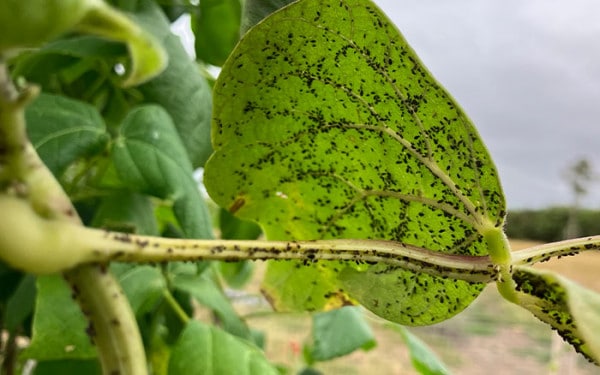Growing beans in your grow-your-own area or among ornamentals in the garden is a really rewarding choice. However, they’re so good that there may be more interest in the plants than from you or the kids. Keep an eye out for colonies of blackfly or black bean aphids that take fancy to the broad beans.
How to spot blackfly
During growing seasons, blackfly can be spotted on many vegetables. Blackflies are a common pest in the garden. They are only 2mm long, and black in colour as their name suggests, but they often have flecks of white on them too.
These pests form large colonies and cluster together. They appear on stems, the underside of leaves, or on flowers. They are sap-sucking insects that create what looks like blackfly blankets on foliage.
In some cases, leaves and fruit that have been affected can become tightly curled or blistered. This makes the plant look misshapen and can lead to an unproductive plant.
Blackfly eggs are laid and left to overwinter on plants, usually woody or shrubby ones. Then they hatch in spring where they begin to feast on young growth. They then move to soft, foliage plants where they do their damage.

Keep control of blackfly on broad beans
A blackfly attack on broad beans can lead to poor formation of pods. But getting control of the problem early means you can still have a harvest of delicious beans.
It’s ideal to check the beans daily and spray off any early signs of the pests, but if it’s already past that point, any shoots that are covered in blackfly should be cut off and discarded as soon as possible.
The removal of the shoots will also help the bean pods to swell, leading to better crops.
Throughout growing season it’s ideal to check over plants regularly so any pest problems can be nipped in the bud sooner rather than later.
Light attacks can sometimes be washed off with the hosepipe, wiped off with a damp cloth, or using a finger and thumb you can squash aphid colonies before the pests get out of hand.
However, my top tip with controlling pests in the garden is to encourage ‘garden bouncers’ into the area. Use plants and inviting habitats such as wild corners, bug hotels and insect houses to make it a welcoming space for ladybirds, ground beetles, earwigs, and hoverflies who will prey on aphids.

Companion planting
To stay one step ahead, there are a couple of companion plants that can prevent aphids from feasting on your vegetable garden.
Alliums like onions, garlic, leeks, and chives have a strong fragrance that repels aphids.
Then, planting marigolds can drive a variety of pests away including cabbage moths and cabbage white butterflies, once again because of the strong scent.


Leave A Comment